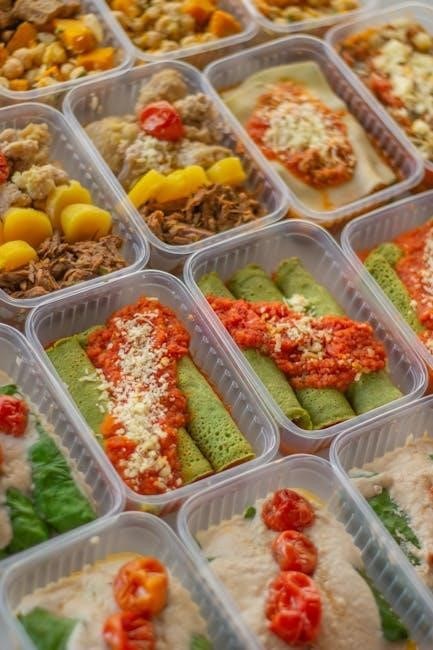A well-structured muscle gain diet plan is essential for achieving lean muscle growth. It combines proper nutrition, caloric intake, and macronutrient balance to support strength training and recovery effectively.
What is a Diet Plan for Muscle Gain?
A diet plan for muscle gain is a structured approach to nutrition designed to support muscle growth and strength. It focuses on creating a caloric surplus, ensuring adequate protein intake, and balancing carbohydrates and fats. The plan is tailored to individual goals, training intensity, and body composition. It often includes meal frequency strategies, hydration tips, and supplementation advice. The key is to provide the body with the necessary nutrients to recover from workouts and build lean muscle tissue. A well-designed plan also considers personal preferences and lifestyle, making it sustainable for long-term results. By combining proper nutrition with consistent training, a muscle gain diet plan helps individuals achieve their fitness objectives effectively.
Why Nutrition is Crucial for Building Muscle
Nutrition is the foundation of any successful muscle-building journey. It provides the body with the necessary building blocks and energy to repair and grow muscle tissue. Without proper fuel, even the most intense workouts won’t yield optimal results. A muscle gain diet plan ensures a caloric surplus, supplying the energy needed for muscle growth and recovery. Protein, carbohydrates, and healthy fats play vital roles in this process, supporting muscle repair, energy production, and hormone balance. Poor nutrition can lead to plateaus, fatigue, and inadequate recovery, hindering progress. Therefore, a well-structured diet is essential for achieving muscle-building goals and maintaining overall health.

Understanding Macronutrients for Muscle Gain
Macronutrients are crucial for muscle gain, providing the energy and building blocks needed for growth. Proteins, carbs, and fats support muscle repair, energy, and recovery.
The Role of Proteins in Muscle Building

Proteins are essential for muscle growth and repair, making them a cornerstone of any muscle gain diet plan. They provide the building blocks, known as amino acids, that muscles need to recover and grow after workouts. Consuming sufficient protein ensures that your body can synthesize new muscle tissue, which is critical for hypertrophy. Aim for 1.2–2.2 grams of protein per kilogram of body weight daily, spread evenly across meals to maintain a positive nitrogen balance. High-quality sources include lean meats, fish, eggs, dairy, and plant-based options like legumes and tofu. Without adequate protein intake, muscle recovery and growth are hindered, making it difficult to achieve your muscle-building goals effectively.
Importance of Carbohydrates for Energy
Carbohydrates are the primary energy source for workouts and daily activities, making them vital for a muscle gain diet plan. They fuel intense training sessions, enabling you to lift heavier and longer, which is essential for muscle growth. Carbs also help prevent muscle breakdown by sparing protein for its primary role in muscle repair and growth. Consuming complex carbs like whole grains, fruits, and vegetables provides sustained energy and supports recovery. Additionally, carbohydrates replenish glycogen stores, which are crucial for high-intensity exercises. Balancing carb intake with protein and fats ensures optimal energy levels and supports the overall muscle-building process. Proper carb timing around workouts can further enhance performance and recovery, making them a cornerstone of an effective muscle gain diet plan.
How Fats Support Hormone Production and Recovery
Fats are essential for hormone production, which plays a critical role in muscle growth and recovery. Healthy fats, particularly omega-3 and omega-6 fatty acids, support the synthesis of anabolic hormones like testosterone and growth hormone. These hormones are vital for muscle repair and development. Additionally, fats aid in the absorption of fat-soluble vitamins (A, D, E, and K), which are important for overall health and immune function. Including sources like avocados, nuts, and olive oil in your diet ensures adequate fat intake. Fats also provide sustained energy and reduce inflammation, promoting faster recovery after intense workouts. Balancing intake with other macronutrients ensures your body has the necessary tools to build and repair muscle tissue effectively, making fats a crucial component of a muscle gain diet plan.

Creating a Meal Plan for Muscle Gain
A well-structured meal plan is vital for muscle gain, focusing on macronutrient balance, portion control, and meal timing. Adjusting intake based on progress ensures sustained growth and recovery.
Calculating Caloric Needs for Muscle Growth
To build muscle effectively, it’s crucial to calculate your daily caloric needs accurately. A caloric surplus is essential, as it provides the energy your body requires to repair and grow muscle tissue. Start by determining your maintenance calories, which is the number of calories your body burns at rest. This can be calculated using formulas like the Mifflin-St Jeor equation, which considers factors such as age, weight, and activity level. Aim for an additional 250-500 calories above your maintenance level to support muscle growth. Adjust your intake based on progress, ensuring you’re gaining 0.5-1 pound of muscle per week. Tracking your intake and adjusting as needed will help you stay on track and optimize results.
Meal Frequency and Timing Strategies
Eating the right number of meals at the right times is vital for muscle growth. Aim for 5-6 balanced meals per day to maintain a steady supply of nutrients and keep your metabolism active. Include a protein-rich meal or snack every 2-3 hours to support continuous muscle protein synthesis. Timing meals around workouts is also key—consume a meal with carbohydrates and protein 1-2 hours before training to fuel performance, and within 30-60 minutes post-workout to aid recovery. Consistency is important, so maintain a regular eating schedule. Avoid long periods without food to prevent muscle breakdown. Proper meal timing ensures your body has the resources it needs to build and repair muscle tissue effectively.
Sample Meal Ideas for a Muscle-Building Diet
Creating a muscle-building diet involves incorporating nutrient-dense meals that provide adequate protein, carbohydrates, and healthy fats. For breakfast, consider options like scrambled eggs with whole-grain toast, Greek yogurt with berries and granola, or oatmeal topped with bananas and peanut butter. Mid-morning snacks could include a protein shake with almond butter or a handful of mixed nuts and fresh fruit. Lunch ideas might feature grilled chicken breast with quinoa and steamed vegetables, or a hearty salad with tuna, avocado, and sweet potatoes. Post-workout, opt for a recovery smoothie with whey protein, spinach, and mango. Dinner could include lean beef with brown rice and broccoli or baked salmon with roasted potatoes and asparagus. Staying hydrated and adjusting portion sizes based on caloric needs is key to maximizing results.

The Importance of Hydration
Hydration is crucial for muscle function and recovery. Aim to drink at least 3-4 liters of water daily, adjusting for activity levels and sweat loss to stay optimal.
How Water Affects Muscle Recovery and Growth
Water plays a critical role in muscle recovery and growth by facilitating nutrient transport, removing waste products, and maintaining cellular hydration. Proper hydration ensures that nutrients are efficiently delivered to muscles, supporting repair and growth after workouts. Even mild dehydration can impair physical performance and slow recovery, leading to muscle fatigue and soreness. Staying hydrated also helps regulate body temperature and lubricate joints, which is essential for intense training sessions. Aim to drink 3-4 liters of water daily, adjusting for activity levels and sweat loss. Tracking urine color can help gauge hydration—pale yellow indicates optimal levels. Incorporating water-rich foods and monitoring intake throughout the day can further enhance recovery and muscle-building efforts.

Best Practices for Staying Hydrated
Staying hydrated is vital for overall health and muscle-building success. Aim to drink 3-4 liters of water daily, adjusting for activity levels and sweat loss. Carry a reusable water bottle to track intake and set reminders to drink regularly. Monitor urine color—pale yellow indicates proper hydration. Incorporate water-rich foods like fruits and vegetables to supplement fluid intake. Avoid overhydration, which is rare but possible, and drink when thirsty. For intense workouts, consider adding electrolytes to maintain hydration balance. Prioritizing hydration supports muscle growth by ensuring efficient nutrient delivery and waste removal. Make it a habit to drink water before, during, and after meals and workouts to maintain optimal hydration levels throughout the day.

Supplements for Muscle Gain
Supplements like protein powders, creatine, and BCAAs support muscle growth and recovery by providing essential nutrients, boosting workout performance, and enhancing endurance effectively.
Protein Powders and Their Benefits
Protein powders are a popular and convenient supplement for those aiming to gain muscle. They provide a concentrated dose of high-quality protein, essential for muscle repair and growth. Whey protein, casein protein, and plant-based options like pea or rice protein are common choices, each offering unique benefits. Protein powders are ideal for post-workout recovery, helping to replenish muscle tissues and promote synthesis. They are also useful for meeting daily protein goals, especially for those with busy lifestyles. By incorporating protein powders into a muscle-building diet, individuals can ensure they are fueling their bodies adequately for optimal results. Consistent use, combined with a well-structured meal plan, can significantly enhance muscle growth and overall performance.
Role of Creatine in Muscle Strength and Endurance
Creatine is one of the most widely used and researched supplements for enhancing muscle strength and endurance. It works by increasing the amount of phosphocreatine in the muscles, which helps replenish ATP during high-intensity activities. This allows for more intense workouts and faster recovery between sets. Studies consistently show that creatine supplementation can significantly improve muscle performance, particularly in activities requiring short bursts of energy. Additionally, creatine may help promote long-term muscle growth by enabling greater training volume. It is naturally found in foods like red meat and fish but is most effective when taken as a supplement. Proper hydration is essential when using creatine, as it helps maximize its benefits. For those seeking to enhance their muscle-building efforts, creatine is a safe and effective addition to a well-structured muscle gain diet plan.
Other Supplements Like BCAAs and HMB
Branched-Chain Amino Acids (BCAAs) and beta-Hydroxy beta-Methylbutyrate (HMB) are popular supplements that support muscle recovery and growth. BCAAs, consisting of leucine, isoleucine, and valine, help reduce muscle soreness and promote protein synthesis, making them ideal for intense workouts. HMB, a metabolite of leucine, further enhances recovery by reducing muscle damage and fat loss during caloric deficits. Both supplements are particularly beneficial for athletes engaged in high-intensity training, as they aid in maintaining muscle mass and endurance. When combined with a well-structured muscle gain diet plan, these supplements can accelerate progress and support overall muscle-building goals. Proper timing and dosage are essential to maximize their effectiveness and ensure optimal results.

Tracking Progress and Adjusting the Diet Plan
Regularly monitoring your progress through a food diary and body measurements ensures your diet plan remains effective. Adjustments to calorie intake and macronutrient ratios can optimize muscle gain and fat loss, helping you stay on track to meet your goals.
Setting Realistic Goals for Muscle Gain
Setting realistic goals is crucial for a successful muscle gain journey. Aim to gain 0.5 to 1 kg of lean muscle per week to ensure sustainable progress. Define clear, measurable objectives aligned with your fitness level and lifestyle. Break down long-term goals into shorter milestones, such as increasing strength or muscle mass over 6-12 weeks. Track progress through regular weigh-ins, body measurements, and progress photos. Adjust your diet and training plan based on results, ensuring consistency and patience. Celebrate small victories to stay motivated and maintain commitment to your program. Unrealistic expectations can lead to discouragement, so focus on steady, incremental improvements for long-term success.

Using a Food Diary for Accountability
A food diary is a powerful tool for maintaining accountability in your muscle-building journey. By documenting every meal, snack, and drink, you can monitor your daily intake and ensure adherence to your diet plan. This helps identify patterns, track progress, and make necessary adjustments. Writing down your meals fosters mindfulness and prevents overeating or under-eating. It also allows you to review your nutrition in relation to workout performance and recovery. Over time, a food diary becomes a valuable resource for refining your strategy and staying committed to your goals. Consistency in tracking can lead to better habits and a stronger connection to your muscle-building objectives, making it easier to stay on course and achieve results.

Common Mistakes to Avoid
Overtraining, ignoring caloric surplus, and poor meal timing are common mistakes that hinder muscle gain. These errors can slow progress and affect overall recovery and performance.
Overtraining and Its Impact on Nutrition
Overtraining can negatively impact your nutrition plan and hinder muscle growth. When you train excessively without adequate recovery, your body depletes its energy stores and increases muscle breakdown. This can lead to fatigue, decreased performance, and a higher risk of injury; Neglecting proper nutrition during overtraining worsens these effects, as your body requires more nutrients to repair and rebuild muscle tissue. A lack of sufficient protein, carbohydrates, and hydration can exacerbate muscle soreness and slow recovery. Additionally, overtraining can disrupt appetite and metabolism, making it harder to maintain the caloric surplus needed for muscle gain. Balancing intense workouts with proper rest and nutrition is crucial to avoid these issues and support overall muscle growth effectively.
Underestimating the Importance of Caloric Surplus
One of the most common mistakes in a muscle gain diet plan is underestimating the importance of maintaining a caloric surplus. A caloric surplus provides the energy your body needs to build and repair muscle tissue. Without enough calories, your body may enter a deficit, leading to muscle loss rather than gain. Consuming more calories than you burn ensures that your body has the necessary resources to support muscle growth. This surplus should come from a balanced mix of proteins, carbohydrates, and fats to fuel workouts and recovery. Ignoring the need for a caloric surplus can result in slower progress, fatigue, and even muscle breakdown. A well-planned diet ensures you meet your caloric needs while avoiding excessive fat gain, making it a cornerstone of effective muscle-building strategies.
Consistency and patience are key to success. A well-structured diet plan, balanced meals, and regular progress tracking will help achieve your muscle-building goals effectively.
Final Tips for Success on a Muscle Gain Diet Plan
Consistency and patience are key to achieving muscle gain. Ensure you stay hydrated, as water plays a crucial role in muscle recovery and growth. Maintain a balanced diet rich in proteins, carbohydrates, and healthy fats, and avoid excessive sugar and saturated fats. Track your progress with a food diary to stay accountable and make adjustments as needed. Combine your diet with regular strength training and adequate rest for optimal results. Lastly, consult a nutritionist or fitness professional to tailor your plan to your specific goals and body type.
Remember, muscle gain is a gradual process. Stay committed, and celebrate small victories along the way to keep motivation high. With dedication and the right strategy, you can achieve your muscle-building goals effectively.